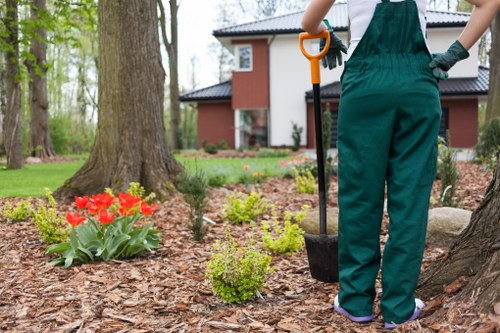Comprehensive Guide to Garden Maintenance in Regents Park
Introduction to Garden Maintenance in Regents Park

Maintaining a beautiful garden in Regents Park requires dedication, knowledge, and the right set of tools. Whether you're a seasoned gardener or a novice, understanding the unique climate and soil conditions of Regents Park is essential for creating a thriving outdoor space.
Regents Park, known for its lush greenery and vibrant flora, offers gardeners a diverse range of plants to cultivate. However, the maintenance tasks can be challenging without proper planning and execution. This guide aims to provide you with comprehensive insights into effective garden maintenance practices tailored specifically for Regents Park.
From seasonal planting schedules to pest control and soil management, we've got you covered. Let's delve into the essential aspects of maintaining a stunning garden in this picturesque location.
Understanding the Climate and Soil of Regents Park

The first step in effective garden maintenance is understanding the local climate and soil conditions. Regents Park experiences a temperate climate with moderate rainfall, making it conducive for a variety of plants. However, the specific microclimates within the park can affect plant growth differently.
The soil in Regents Park is primarily loamy, offering good drainage and fertility. To enhance soil quality, regular testing and amendments are recommended. Incorporating organic matter such as compost can improve soil structure and nutrient content, promoting healthier plant growth.
Additionally, understanding the pH levels of your soil is crucial. Most plants thrive in slightly acidic to neutral soil. If your soil is too alkaline or too acidic, it can hinder nutrient uptake, affecting plant vitality.
Seasonal Gardening Tasks

Maintaining a garden in Regents Park involves performing specific tasks each season to ensure continuous growth and blooming. Here's a breakdown of essential seasonal activities:
Spring
- Planting: This is the ideal time to plant new flowers, shrubs, and trees.
- Pruning: Remove dead or damaged branches to encourage healthy growth.
- Weeding: Regular removal of weeds prevents competition for nutrients.
Summer
- Watering: Ensure plants receive adequate moisture, especially during dry spells.
- Mulching: Apply mulch to retain soil moisture and suppress weed growth.
- Pest Control: Monitor for pests and take necessary actions to protect your plants.
Autumn
- Leaf Cleanup: Remove fallen leaves to prevent fungal diseases.
- Soil Preparation: Amend the soil with compost to prepare for winter.
- Planting Bulbs: Plant spring-flowering bulbs during this season.
Winter
- Protecting Plants: Use coverings to shield sensitive plants from frost.
- Tool Maintenance: Clean and store gardening tools properly.
- Planning: Plan your garden layout and select plants for the upcoming year.
Essential Tools for Garden Maintenance

Having the right tools is imperative for effective garden maintenance. Investing in quality equipment can make your gardening tasks easier and more efficient. Here are some essential tools every Regent's Park gardener should have:
- Pruners and Shears: For trimming and shaping plants.
- Garden Fork: Useful for turning and aerating the soil.
- Watering Can or Hose: Ensures plants receive adequate moisture.
- Wheelbarrow: Helps in transporting soil, compost, and plants.
- Gloves: Protect your hands from thorns, dirt, and pests.
Maintaining your tools by cleaning and sharpening them regularly extends their lifespan and ensures they function effectively when needed.
Pest and Disease Management

Pests and diseases can significantly impact the health of your garden. Implementing proactive measures can help prevent infestations and outbreaks. Here are some strategies for effective pest and disease management in Regents Park:
Integrated Pest Management (IPM)
IPM combines biological, cultural, and chemical practices to manage pests sustainably. Start by identifying the pests and understanding their life cycles to target them effectively.
Biological Controls
- Introduce natural predators like ladybugs and lacewings to control harmful insects.
- Use neem oil as a natural pesticide to deter pests without harming beneficial insects.
Cultural Practices
- Rotate crops to prevent soil-borne diseases.
- Ensure proper spacing and airflow to reduce fungal growth.
Chemical Controls
- Use chemical pesticides as a last resort, following the recommended guidelines.
- Opt for eco-friendly and biodegradable options to minimize environmental impact.
Regular monitoring and early intervention are key to managing pests and diseases effectively.
Soil Health and Fertilization

Healthy soil is the foundation of a thriving garden. Maintaining soil quality involves regular testing, amendment, and proper management practices. Here's how to keep your soil in optimal condition:
Soil Testing
Conduct soil tests to determine nutrient levels, pH balance, and composition. This information helps in selecting appropriate fertilizers and soil amendments.
Organic Matter
Incorporate organic matter like compost, manure, or leaf mold to enhance soil structure and fertility. Organic matter improves water retention and provides essential nutrients to plants.
Mulching
Apply mulch around plants to retain moisture, regulate soil temperature, and suppress weed growth. Organic mulches like bark or straw also add nutrients as they decompose.
Fertilization
Use balanced fertilizers based on your soil test results. Avoid over-fertilizing, which can lead to nutrient runoff and environmental issues.
Watering Strategies for Regents Park Gardens

Watering is a critical aspect of garden maintenance. Proper watering ensures that plants receive the moisture they need without causing waterlogging or drought stress. Here are effective watering strategies for Regents Park:
Deep Watering
Water deeply but infrequently to encourage deep root growth. This approach helps plants become more drought-resistant and resilient.
Morning Watering
Water plants in the early morning to reduce evaporation and allow foliage to dry before nightfall, minimizing the risk of fungal diseases.
Drip Irrigation
Install drip irrigation systems for efficient water delivery directly to the plant roots, reducing water waste and targeting specific areas.
Water Conservation
Collect rainwater using barrels or tanks to use during dry periods. This sustainable practice conserves water and benefits your garden.
Plant Selection and Care

Choosing the right plants is crucial for a successful garden in Regents Park. Select species that are well-suited to the local climate, soil, and sunlight conditions. Here are some tips for plant selection and care:
Native Plants
Native plants are adapted to the local environment, making them more resilient and easier to maintain. They also support local wildlife and biodiversity.
Drought-Tolerant Varieties
Incorporate drought-tolerant plants to reduce water usage and ensure your garden thrives during dry spells.
Seasonal Blooms
Choose plants that bloom in different seasons to maintain color and interest throughout the year.
Proper Planting Techniques
Plant at the right depth and spacing to promote healthy growth. Ensure that each plant has enough space to spread and access nutrients.
Pruning and Trimming Practices

Regular pruning and trimming are essential for maintaining the shape and health of your plants. Proper pruning techniques enhance growth, improve air circulation, and prevent diseases. Here's how to approach pruning in Regents Park:
When to Prune
Different plants have specific pruning seasons. Generally, spring and late summer are ideal times for most pruning activities.
Tools and Techniques
- Use sharp, clean tools to make precise cuts and reduce the risk of infection.
- Remove dead or diseased branches first, followed by any crossing or overcrowded stems.
- Cut at a slight angle to promote healing and deter pests.
Benefits of Pruning
Pruning helps shape plants, encourages new growth, and enhances overall plant health. It also allows for better light penetration and air circulation, reducing the chances of fungal infections.
Mulching for Moisture and Weed Control

Mulching is a simple yet effective technique for retaining soil moisture, suppressing weeds, and enhancing the appearance of your garden. Here's how to implement mulching in Regents Park:
Types of Mulch
- Organic Mulch: Includes bark, straw, leaves, and compost. It enriches the soil as it decomposes.
- Inorganic Mulch: Comprises gravel, pebbles, and plastic sheeting. It provides long-term weed suppression but does not improve soil quality.
Application Tips
Apply a 2-3 inch layer of mulch around plants, keeping it a few inches away from plant stems to prevent rot. Refresh the mulch annually to maintain its effectiveness.
Benefits of Mulching
- Reduces water evaporation, conserving moisture for plants.
- Suppresses weed growth, minimizing competition for nutrients.
- Regulates soil temperature, protecting roots from extreme conditions.
Mulching not only benefits plant health but also adds visual appeal to your garden, creating a neat and organized appearance.
Weed Control Strategies

Weeds can quickly overtake a garden, competing with desirable plants for resources. Effective weed control is essential for maintaining a healthy garden in Regents Park. Here are some strategies to manage weeds:
Manual Weeding
Regularly remove weeds by hand or with tools. Ensure you remove the entire root system to prevent regrowth.
Mulching
As mentioned earlier, applying mulch helps suppress weed growth by blocking sunlight and creating a barrier.
Herbicides
Use chemical herbicides sparingly and follow the application instructions carefully. Preferably, opt for eco-friendly options to minimize environmental impact.
Preventive Measures
- Introduce ground covers that outcompete weeds for space and nutrients.
- Maintain healthy soil to reduce the likelihood of weed infestations.
Consistent weed management ensures that your garden plants can thrive without unnecessary competition.
Composting and Waste Management

Composting is an excellent way to recycle garden waste and enrich your soil naturally. Implementing a composting system in Regents Park can provide numerous benefits:
Benefits of Composting
- Soil Enrichment: Compost adds essential nutrients to the soil, promoting healthy plant growth.
- Waste Reduction: Composting reduces the amount of organic waste sent to landfills.
- Improved Soil Structure: It enhances soil texture, water retention, and aeration.
How to Compost
- Select a Composting Site: Choose a well-drained area with good airflow.
- Gather Materials: Use a mix of green materials (kitchen scraps, fresh plant trimmings) and brown materials (dry leaves, branches).
- Maintain the Pile: Turn the compost regularly to aerate and speed up decomposition.
- Harvest: After several months, your compost will be ready to use as a nutrient-rich soil amendment.
Composting Tips
Ensure a balanced carbon-to-nitrogen ratio for optimal decomposition. Avoid adding meat or dairy products, which can attract pests and cause odors.
Lighting and Irrigation Systems

Proper lighting and efficient irrigation systems enhance the functionality and aesthetics of your garden in Regents Park. Here's how to incorporate these elements effectively:
Garden Lighting
- Pathway Lighting: Illuminate walkways to ensure safety and add a decorative touch.
- Spotlighting: Highlight focal points like statues, water features, or special plants.
- Ambient Lighting: Create a warm and inviting atmosphere for evening gatherings.
Irrigation Systems
- Drip Irrigation: Provides targeted watering, reducing water waste and ensuring efficient moisture delivery.
- Sprinkler Systems: Suitable for larger areas, ensuring even coverage across the garden.
- Automated Timers: Save time and ensure consistent watering schedules.
Integrating lighting and irrigation systems can significantly improve the usability and beauty of your garden, making maintenance easier and more effective.
Creating a Year-Round Garden Plan

To maintain a vibrant garden throughout the year, it's essential to create a comprehensive garden plan. This plan should account for seasonal changes, plant selection, and maintenance tasks. Here's how to develop an effective year-round garden plan for Regents Park:
Planning Your Garden
- Assess Sunlight: Determine which areas receive full sun, partial shade, or full shade to select appropriate plants.
- Design Layout: Organize plant beds, pathways, and focal points for an aesthetically pleasing arrangement.
- Choose Plant Varieties: Select a mix of perennials, annuals, shrubs, and trees to ensure continuous blooming and interest.
Seasonal Adjustments
- Spring: Focus on planting and preparing beds for the growing season.
- Summer: Emphasize watering, mulching, and pest management.
- Autumn: Prepare plants for winter by pruning and soil enrichment.
- Winter: Protect sensitive plants and plan for the upcoming year's garden.
Monitoring and Flexibility
Regularly monitor your garden's progress and be prepared to make adjustments based on weather conditions and plant performance. Flexibility ensures that your garden remains healthy and vibrant despite unforeseen challenges.
Sustainable Gardening Practices

Adopting sustainable gardening practices not only benefits your garden but also contributes to environmental conservation in Regents Park. Here are some sustainable techniques to incorporate:
Water Conservation
Implementing efficient watering systems and using drought-tolerant plants helps conserve water resources.
Organic Gardening
Avoid chemical pesticides and fertilizers by using organic alternatives. This promotes a healthier ecosystem and reduces pollution.
Biodiversity
Encourage biodiversity by planting a variety of species, supporting pollinators, and providing habitats for beneficial insects.
Composting
As discussed earlier, composting recycles organic waste and enriches the soil naturally.
By integrating sustainable practices, you create a resilient and eco-friendly garden that thrives in harmony with nature.
Conclusion: Maintaining Your Regents Park Garden

Effective garden maintenance in Regents Park involves a combination of understanding local conditions, performing regular maintenance tasks, and adopting sustainable practices. By following the guidelines outlined in this article, you can create and maintain a garden that not only looks stunning but also contributes positively to the environment.
Remember, gardening is a continual learning process. Stay informed about new gardening techniques, experiment with different plant varieties, and enjoy the rewarding experience of nurturing a beautiful outdoor space.
Contact us today to learn more about our gardening services and how we can help you achieve the garden of your dreams in Regents Park.